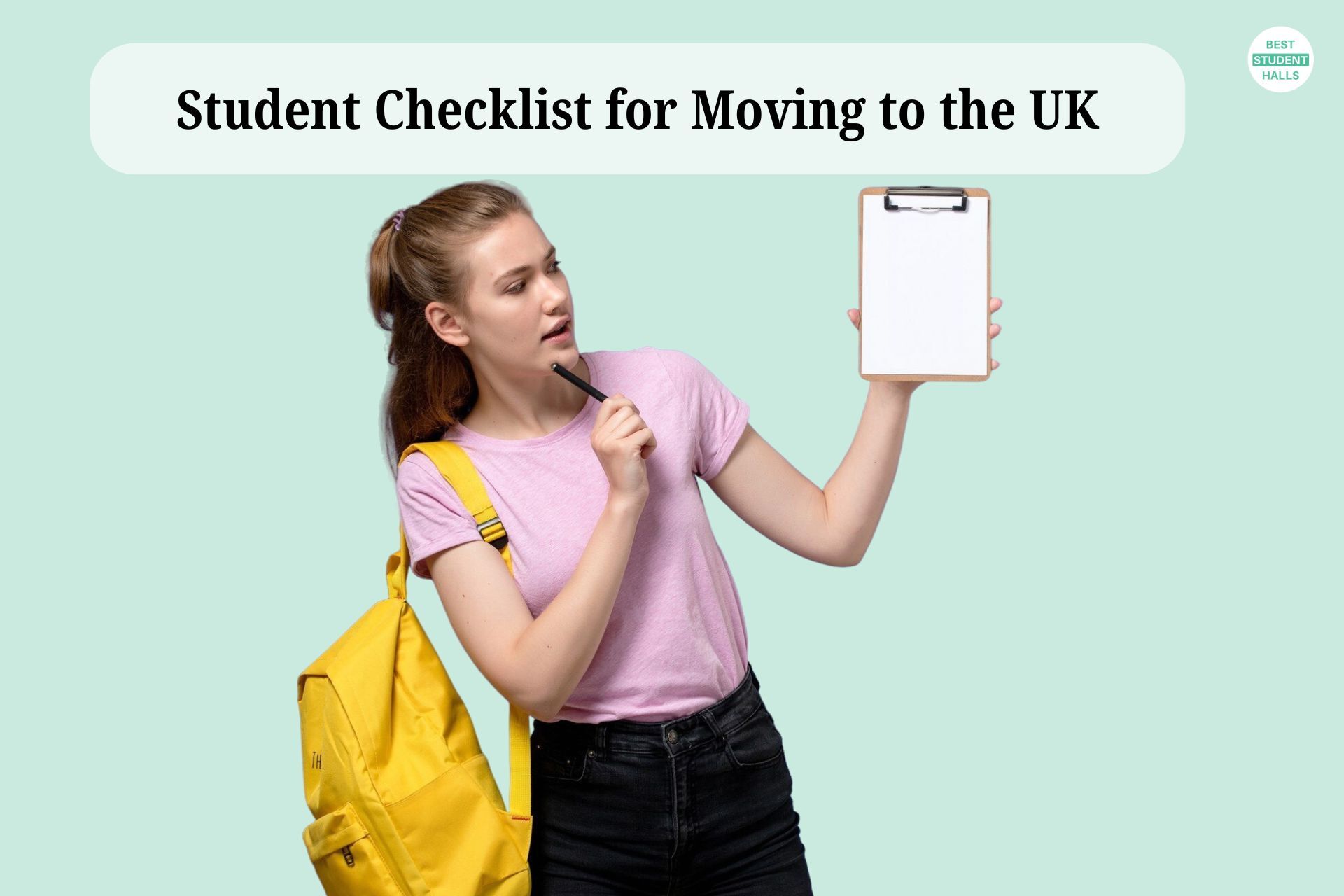

The Ultimate International Student Checklist for Studying in the UK
So, you’re ready to swap the comfort of your home for the cobblestone streets of the UK? Whether you’re dreaming of sipping tea in a cosy cafe in Edinburgh or navigating the bustling streets of London, studying in the UK is an exciting journey. But before you pack your bags and start practising your British accent, there’s a checklist to conquer.
Studying in the UK is an exciting opportunity to immerse yourself in world-class education, rich cultural experiences, and diverse communities. However, the path to becoming a successful international student in the UK requires careful planning and preparation. Packing your bags is an easy task, in my opinion. The real work is wrangling paperwork, managing money, and avoiding panic when you realise that you’ve forgotten your university acceptance letter at home.
From securing the necessary visas to adapting to a new cultural environment, each step is crucial to ensure a smooth transition and a fulfilling academic journey. This comprehensive student checklist for moving to the UK is designed to help you tackle every essential step. We’ll walk you through the essential documents to carry, help you find suitable student accommodation in the UK, and assist you with budgeting for international students. By the end of this guide, you’ll have the list to pack all the necessary things, along with cultural adaptation tips for the UK to help you settle in comfortably.
Student Checklist for Moving to the UK: Before Arrival
So, you’ve received your acceptance letter, and the excitement of studying in the UK is building. But before you zip up that suitcase, let’s ensure you’ve ticked off the crucial steps to set yourself up for success.
Pre-departure Checklist with Essential Documents
Letter of Acceptance
Your University Acceptance Letter is the key that unlocks your future in the UK. The student visa process is highly dependent on your acceptance into a recognised university in the UK. Without this letter, your visa application lacks the essential proof of admission, making it impossible to process.
The offer letter is a gateway to financial planning as it often outlines your course fees and may include details about scholarships or financial aid. Always keep both digital and physical copies of your acceptance letter. The digital version is essential for online applications, while a printed copy is useful for in-person registrations and meetings.
Note: Ensure that all personal information, course details, and dates are accurate. Any discrepancies can lead to complications in your UK visa application or university registration.
Obtain Your CAS
First things first: secure your Confirmation of Acceptance for Studies (CAS). This isn’t just a formality, it’s your golden ticket to a UK student visa. Once you’ve accepted your university offer, the institution will issue your CAS, detailing your course and financial requirements. You can even apply for it via UCAS or direct apps. This document is one of the vital UK student visa requirements and serves as proof of your enrollment.
Always Keep Your Passport Handy
Your passport is more than just a travel accessory, it’s your official identity on the global stage. For international students heading to the UK, a valid passport is non-negotiable. You are required to submit your passport when applying for a UK student visa. This is because it’s the primary document that authorities use to verify your identity and nationality.
Airlines and immigration authorities will also require your passport to allow you to board and enter the UK. In case of emergencies, like lost belongings or medical issues, your passport is essential for accessing consular services and receiving assistance from your home country’s embassy or consulate.
Please note: Ensure your passport is valid for at least six months beyond your planned return date. Some countries have stringent entry requirements, and an expired or nearly expired passport can lead to denied boarding or entry.
Apply for a Student Visa
With your CAS in hand, it’s time to apply for your UK student visa. Our UK Student Visa Guide will walk you through the intricacies of applying for a successful student visa as an international student in the UK. As of January 2025, the financial requirements for applying for a student visa in the UK have been updated:
- London: £1,483 per month for up to 9 months (total: £13,347)
- Outside London: £1,136 per month for up to 9 months (total: £10,224)
These funds must be held in your account for at least 28 consecutive days before applying. Check out our blog on understanding the 28-day rule for UK Visa applications for a detailed understanding of the rule. Additionally, ensure you have sufficient funds to cover your course fees, as specified in your CAS. Remember, meeting these financial requirements is crucial for a successful visa application.
Ensure You Have Proof of Funds
One of the most critical aspects of your UK student visa application is proving that you have sufficient funds to cover your tuition fees and living expenses. Funds can come from personal savings, parental support, scholarships, or government loans. If the funds are from a parent or legal guardian, you’ll need to provide proof of relationship and their consent. Plan ahead and ensure your finances are in order well before applying. Refer to our comprehensive guide on sample bank statement for visa application to get an idea about which documents to carry.
Note: Delays in providing proof of funds can lead to delays in your visa application process.
Book your Student Accommodation in Advance
Finding a place to call home is next on the list. Student halls in the UK vary widely in terms of cost and style. On-campus student residences typically range from £250 to £300 per week. Private rentals, on the other hand, can be more affordable, especially if you share with friends or fellow students. For instance, PBSAs in cities like Manchester or Birmingham might cost around £150 to £450+ per week.
It is advisable to book your accommodation as early as possible, as demand can be high, especially in popular student cities in the UK. A few universities in the UK offer assistance in finding housing, so be sure to check with your institution’s accommodation office.
Organise Travel Insurance for Students
While you’re packing your favourite snacks and textbooks, don’t forget about travel insurance. Comprehensive travel insurance for international students should cover health, belongings, and potential trip cancellations. This is particularly important if you’re planning to travel within Europe or beyond during your studies. A few UK banks offer packaged current accounts that include travel insurance as a perk, like Nationwide’s FlexPlus account or Virgin Money’s Club M account.
Tip: Remember, securing travel insurance early can save you from unexpected expenses and provide peace of mind as you embark on your UK adventure.
Keep Your Medical History Handy
Having a summary of your medical history can be incredibly helpful if you need medical attention while in the UK. Make sure to:
- Include key details: List any chronic or ongoing conditions, allergies, surgeries, or treatments you’ve had. This information will help UK healthcare providers quickly understand your needs.
- Keep a copy with you: It’s a good idea to bring both a hard copy and a digital version of your medical history in case of emergencies.
This will help you navigate healthcare services with ease and avoid unnecessary delays if you need to see a doctor. Plus, it’s an important document when registering with a GP in the UK, which is a must-do once you arrive.
Stay Updated with Vaccination Records
The UK has specific vaccination requirements, and you must be up-to-date with these before your arrival:
- Required vaccinations: Some universities in the UK may require proof of vaccinations like MMR (measles, mumps, rubella) or tuberculosis, especially for students from countries with higher health risks. Be sure to check with your university for any health insurance for students that may cover vaccination costs or help you with requirements.
- Keep your records updated: Bring a copy of your vaccination records to ensure that you’re all set for university registration and healthcare access.
It’s always a good idea to double-check the NHS guidelines on vaccinations before you go. This helps you stay healthy and compliant with UK regulations while you’re abroad.
Health Insurance for Students
If you’re studying in the UK for six months or more, you’ll pay the Immigration Health Surcharge as part of your UK student visa application. This grants you access to NHS services, including GP visits, hospital treatment, and emergency care. If your course duration is less than six months, consider private health insurance to cover medical expenses.
Plan Ahead for Your Prescriptions
If you’re on any prescribed medication, make sure you bring enough for your stay in the UK. The last thing you want is to run out of medication when you’re adjusting to life in a new country.
- Bring a copy of your prescription: This will make it easier to get a refill if you need to, and can also be useful for customs checks when you arrive.
- Check UK regulations: Certain medications may require special permission to bring into the country, so ensure you’re aware of the UK student visa requirements and any restrictions for your specific medication.
Don’t forget to check whether your medication is available in the UK. Some medications may have different brand names or formulations, so it’s a good idea to discuss this with your doctor before you leave.
Finalising Finances Before Departing
Notify Your Bank About Your Travel Plans
Before leaving, inform your bank about your travel plans to avoid any issues with your international credit or debit cards. This ensures your cards will work seamlessly abroad and helps prevent any security alerts or fraud suspicions.
Monthly Budgeting for International Students
Understanding your monthly expenses is crucial for financial planning. Creating a realistic budget not only helps you manage your finances but also ensures you enjoy your time in the UK without financial stress. Consider the following monthly expenses:
- Accommodation: Costs can vary depending on what you choose, but average estimates say you’ll require £90 to £450+ per week.
- Food: Plan for groceries and occasional dining out.
- Transportation: Use student discounts on public transport and consider walking or cycling to save money.
- Utility Bills: These include costs for water, electricity, gas, and heating. A few accommodation options cover these in rent, while some require you to take care of them by yourself. Check out our guide on managing utility expenses in the UK as a student for in-depth insights on the topic. You can also find the cheapest energy suppliers in the UK to help reduce your monthly costs.
- Study Materials: Budget for books, stationery, and other academic supplies.
- Personal Expenses: Include entertainment, mobile phone bills, and other personal costs.
To tailor your budget to your specific aspects for different UK cities, you can use our cost of living calculator. It will give you an estimate of your monthly spending based on your lifestyle and location, helping you plan more accurately.
Managing your finances will become easier with the right tools. You can use budgeting and expense tracking apps like Mint, YNAB, and PocketGuard that are popular among international students in the UK.Looking for student accommodation?
Our support team can assist you for free Book with BestStudentHalls today!
Packing Essentials for Your Stay in the UK
If you’re wondering what to pack when moving to the UK as an international student, then it's essential to pack thoughtfully to ensure comfort and practicality. Given the UK's variable climate, especially if you're studying in a city like London, layering is key. Think warm sweaters, waterproof jackets, and sturdy shoes. Remember, the UK operates on 230V, 50Hz electricity with Type G plugs, so bring the necessary adapters or check if your electronics are compatible.
Regarding bedding, some student halls in the UK provide it, but it's wise to confirm with your university. If not, you can purchase it locally or bring your own. Don't forget any prescribed medications along with the necessary documentation. Lastly, packing personal items that bring you comfort, like photos, favourite snacks, or a cherished book, can make your new environment feel more like home.
Student Checklist for Moving to the UK: Upon Arrival
Stay Connected: Informing Loved Ones
Upon your arrival in the UK, promptly inform your family and friends of your safe arrival. This not only reassures them but also helps you stay grounded as you adjust to your new environment. Consider:
- Regular updates: Share your experiences and any important developments.
- Emergency plans: Discuss how to reach each other in case of emergencies.
- Time zone considerations: Be mindful of time differences when scheduling calls.
Maintaining strong communication lines is vital for emotional well-being during your transition. You can invest in an eSIM for students to stay connected with your loved ones.
Enrol at Your University
Upon arrival, promptly complete your university registrations. This process grants you access to your student ID, which is crucial for:
- Accessing campus facilities: Use it for entry to libraries, computer labs, and other university amenities.
- Receiving student discounts: Several retailers and services, including transport, offer discounts to students, and your ID is often required.
- Participating in university events: Stay informed about and participate in campus activities and opportunities.
Ensure you have all necessary documents, like your passport, visa, and any required forms, to complete the enrolment process efficiently.
Master Your Money
Studying in the UK is an exciting adventure, but it comes with its financial responsibilities. Here’s how to ensure your finances are in top shape throughout your journey.
Carry Cash for Immediate Expenses Upon Arrival
Having a small amount of cash between £300 and £500 on hand when you arrive in the UK is essential for immediate expenses like transportation, food, and initial accommodation costs. This amount is recommended to cover initial expenses until your UK bank account is set up and accessible.
Open a UK Bank Account
Setting up a UK bank account is essential for managing your finances, receiving funds, and paying bills. It will save you higher transaction fees and ensure you have access to all UK services. To open an account, you’ll typically need:
- Proof of Identity: Your passport or EU national identity card.
- Proof of Student Status: Your university offer letter or a bank letter from the university.
- Proof of Address: A tenancy agreement, utility bill, or a bank letter from the University.
- eVisas or Biometric Residence Permit (BRP): If you’re an international student on a visa, some banks may require your BRP to open an account. However, as the UK government has initiated a transition from physical BRPs to digital eVisas, you’ll need to get the latter. Aimed to fully digitise the immigration systems, eVisas are expected to enhance security and streamline the process of proving immigration status.
Banks like HSBC, Barclays, and Monzo are popular choices among students. For more information and advice on the best UK banks for students, refer to our blog on top UK bank accounts for international students 2025. It is advisable to contact your university’s student services for guidance on the specific documents required and the process involved.
Important Note: From June 2, 2025, the physical documents, including the BRPs and EU Settlement Scheme Biometric Residence Cards (BRCs), will no longer be accepted for travel purposes. To switch to eVisa, you will have to create a UK Visas and Immigration (UKVI) account. Once registered, you can access your digital immigration status, which can be used to prove your right to study, work, rent, or access services in the UK.
Apply for a National Insurance Number (NI Number)
An NI Number is essential if you plan to work part-time during your studies. To apply:
- Eligibility: You must be in the UK and have the right to work.
- Application Process: Apply online through the official website of the UK government.
- Documents Required: You’ll need your identity proof, digital photos, and reason for applying.
Once you have your NI Number, you’ll be able to work legally in the UK.
Prioritising Your Health in the UK
As you prepare for your academic journey in the UK, staying healthy is a top priority. Managing your health while abroad is crucial not just for your well-being but also for making the most of your studies. Seeking help when needed is a sign of strength, and support is always available. Here’s how to stay healthy and supported during your studies.
Register with a GP (General Practitioner)
Upon arrival in the UK, remember to register with a local GP to access NHS services. You’ll need your passport, a university acceptance letter, and proof of address. Some universities in the UK have affiliated medical centres, or they can guide you to nearby GP practices. Registering early ensures timely access to healthcare services.
Mental Health Support
University life can be challenging, and mental health support is available through:
- University Counselling Services: Most UK universities offer free mental health support.
- Your GP: They can refer you to NHS mental health services.
- Helplines: Call Samaritans (116 123) for 24/7 confidential support.
Several institutions offer peer support networks, and well-being programs assist international students in adapting to their new environment.
Communicating and Staying Connected in the Country
By setting up your connectivity and communication tools early, you can focus more on your studies and cultural adaptation, ensuring a smooth transition to life in the UK. Here’s how to ensure seamless communication and connectivity:
Get a UK SIM Card or eSIM
Obtaining a UK SIM card or eSIM upon arrival is crucial for staying connected. Providers like Lebara, EE, and O2 offer student-friendly plans with competitive data allowances and affordable rates. For instance, Lebara provides 50% off SIM-only deals with a voucher, including 3GB of data at £5 per month, ideal for students on a budget.
If you prefer not to swap physical SIM cards, consider an eSIM. Being digital SIMs, eSIMs enable you to activate a cellular plan without a physical SIM card, offering flexibility and convenience. Providers like Airalo and Holafly offer eSIM plans suitable for international students.
Download Essential Apps
Equipping your smartphone with the right apps can significantly enhance your experience as an international student:
- University App: Several UK universities have dedicated apps providing updates on timetables, campus events, and academic resources. For instance, the University of Glasgow uses the SafeZone app to track attendance and ensure visa compliance.
- eMed: Access virtual healthcare services, including consultations with doctors and therapists, through the eMed app. It’s particularly useful for managing health concerns and accessing prescriptions remotely.
- UNiDAYS: Access exclusive student discounts on fashion, tech, food, and more. UNiDAYS partners with over 800 brands to help you save money during your studies.
- Student Beans: Provides access to thousands of discounts across various categories.
- Totum: Offers a range of discounts and benefits for students.
Transportation and Travel: Navigating the UK Like a Local
Getting around the UK efficiently is key to balancing your studies, social life, and exploring your new surroundings. By incorporating these travel tools into your routine, you'll not only save money but also gain confidence in navigating your new environment.
Whether it's commuting to your student accommodation in the UK or exploring the city's cultural landmarks, these resources will make your journey smoother and more enjoyable. Here’s how to travel smart and save money:
UK Student Railcard
The 16-25 Railcard is a must-have for students aged 16-25 or those pursuing full-time degrees. For just £30 a year, it offers:
- 1/3 off most rail fares across Great Britain.
- Discounted fares on London Underground, Overground, and National Rail services when linked to your 18+ Student Oyster Photocard.
The UK Student Railcard can save you an average of £192 annually, making it a wise investment for frequent travellers.
UK Oyster Card
If you’re studying in London, the 18+ Student Oyster photocard is essential. It offers:
- 30% off Travelcards and Bus and Tram Passes.
- 1/3 off-peak pay-as-you-go fares on TfL services when linked with a Railcard.
- Daily fare caps to prevent overspending.
To link your Railcard to your Oyster card, visit a London Underground or Overground station with both cards, and a staff member will assist you.
Public Transport Apps: Your Travel Companion
Transport apps are invaluable for budgeting for international students in the UK and ensuring timely arrivals for classes and social events. Navigating public transport is easier with the right apps:
- Citymapper: Navigate UK cities with ease using real-time public transport information, including bus, train, and metro routes. Citymapper provides step-by-step directions, estimated travel times, and even calorie burn estimates for walking or cycling routes.
- Trainline: Ideal for booking train tickets across the UK, offering comparisons and advance ticket options.
- TfL Go: Offers live updates and journey planning for London’s public transport system.
If you’re studying in London, our guide to London Travel Zones will help you easily navigate the city.
Student Checklist for Moving to the UK: After Arrival
Ensuring a Smooth Transition to UK Student Life
As you immerse yourself in a new culture and environment, here are essential steps to help you settle in smoothly. Remember to embrace the experience and don’t hesitate to seek support when needed. Your university community is there to assist you every step of the way. Being proactive and staying informed will help you navigate academic and social opportunities effectively. Here’s how to ensure you’re fully prepared:
- Academic Preparation for UK Studies
Actively engage in lectures, seminars, and workshops to enhance your learning experience. You can also utilise university libraries, online portals, and academic support services to support your studies.
- Cultural Adaptation Tips for UK Students
Embrace local culture by participating in cultural events and activities to immerse yourself in British society. Build connections by engaging with local and international students to form a supportive community.
Stay Informed: Keep Up with University Communications
Once in the UK, stay updated with your university’s communications by:
- Checking university emails regularly: Look out for important announcements, deadlines, and event invitations.
- Joining orientation sessions: Participate in events designed to help international students acclimate.
- Engaging with university platforms: Utilise apps or websites provided by your institution for news and updates.
Join Societies
Engaging in university clubs and societies is a fantastic way to meet new people and enrich your student experience. Consider:
- Exploring diverse interests: From academic societies to cultural clubs, there’s something for everyone.
- Building a support network: Connect with peers who share similar interests and background.
- Enhancing personal growth: Participate in events and activities that broaden your horizon and skills.
Many top universities in the UK host society fairs during orientation week, providing an excellent opportunity to discover and join groups that align with your interests.
Emergency Contacts: Stay Safe and Informed
Before you embark on your journey, compile a list of important contacts, including:
- University emergency contacts: Such as security or student services.
- Local emergency services: In the UK, dial 999 for emergencies (police, fire, ambulance)
- Healthcare providers: Your local GP and nearest hospital.
- Family and friends: Ensure they have your updated contact information.
Having these contacts readily accessible can provide peace of mind and quick assistance if needed.
Explore the City
Take time to familiarise yourself with your new surroundings. Exploring the city offers several benefits:
- Understanding local amenities: Locate essential services like grocery stores, banks, and healthcare facilities.
- Navigating public transport: Learn the routes and schedules of buses and trains to ease daily commutes.
- Discovering cultural landmarks: Visit museums, parks, and historical sites to enrich your cultural experience.
Tip: Several universities in the UK organise city tours for international students, helping you get acquainted with the area and meet fellow newcomers.
Explore Discounts
Being an international student in the UK comes with its perks. Take advantage of various discounts and offers:
Travel Discounts:
- National Railcard: Provides 1/3 off train fares across the UK.
- 16-25 Railcard: Offers similar discounts for young travellers.
Entertainment and Leisure:
- Theatre Discounts: Several theatres offer reduced ticket prices for students.
- Cinema Deals: Cinemas like Cineworld and Odeon offer student discounts.
Tip: Always carry your student ID or use the respective apps to avail of these discounts.
Your UK Journey Begins: Essential Final Preparations for International Students
With this comprehensive student checklist for moving to the UK, you’re well-prepared to embark on your academic adventure. From understanding UK student visa requirements to securing student accommodation in the UK, each step ensures a smooth transition. Remember to plan your finances with budgeting for international students in mind, and don’t overlook the importance of health insurance for students to safeguard your well-being.
As you settle into your new environment, immerse yourself in academic preparation for UK studies and stay updated with these cultural adaptation tips for the UK. Engage with local communities, explore new interests, and make the most of this exciting chapter in your life.
Stay curious, stay connected, and capitalise every opportunity that comes your way. Your journey in the UK is just beginning, and it's filled with endless possibilities.
Looking for the perfect place to call home during your studies?Best Student Halls offers a range of student halls in the UK, tailored to fit your needs and budget.
Frequently Asked Questions
When should I start packing for a move to the UK?
Start packing at least two months in advance so that you can cover everything, from clothes to documents. Packing everyday essentials is not rocket science, but getting all the documents ready, carrying them safely, and keeping them intact is not a piece of cake.
What is the checklist for your UK student visa?
To apply for a student visa in the UK, you’ll require your current passport, university acceptance letter, CAS, proof of funds, health reports, and passport-size photographs of yourself.
What to pack when moving to the UK?
It is advised that you pack as many warm layers as possible, as the UK weather is highly unpredictable. You can include clothes like jumpers, coats, and scarves, along with a waterproof jacket and versatile footwear options. You can check out our blog on Essential Packing List and Hacks for Students Studying Abroad for more information on what to pack when moving to the UK as an international student.
How much is the IHS fee for a UK student visa in 2025?
The Immigration Health Surcharge (IHS) fee for a UK student visa in 2025 varies depending on the duration of your stay. However, it is generally calculated at £776 per year of your stay.
How much bank balance should I show for a UK student visa?
If you’re moving to the UK as an international student, you will be required to show proof of funds with a steady bank balance for at least 28 days. A balance of £13,347 in London and £10,224 outside London is usually required for a 9-month stay. This balance should cover your tuition fees, stay, and other expenses in the UK for the duration of your stay. You can refer to our blog on Financial Requirements for a UK Student Visa Application for in-depth insights on the topic.

Bhakti
Bhakti is a talented content writer, editor and social media enthusiast. Her in-depth blogs and city guides reflect her curious mind and love for writing. Her creativity and research-intensive approach allow her to create informative articles with a fresh perspective. She often includes hot tips that make for an engaging and impactful read. Bhakti is a fan of tennis, fashion and literature with a special interest in digital culture.

Design Your Degree: UCAS Courses and Universities for Your Future Career

The Ultimate Guide to Brighton Transport System for Students

Weird UK Laws You Never Knew About


 Free Cancellation
Free Cancellation














Comments
Leave a comment